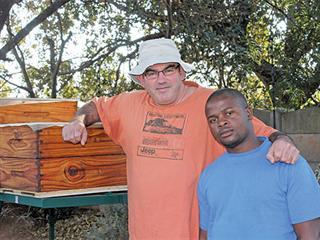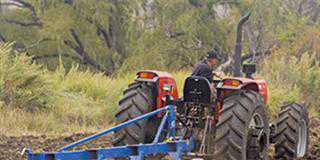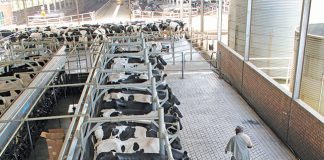
Up to now, beekeeping projects aimed at poverty alleviation have not had much success in South Africa. Guy Stubbs, founder of African Honey Bee, explains that this is because the projects are small, with an unsustainable number of hives, or else co-operative structures have been imposed on beneficiaries without incentives to encourage individual success.
To address these issues, Stubbs developed a micro-franchising model consisting of family-owned and operated beekeeping businesses. These are linked to a larger pool of franchisees all receiving support from the franchise organisation, while still operating independently. Each beekeeper within the African Honey Bee model has the potential to produce about 18kg of premium honey and 18kg of industrial honey per hive, annually. “At current retail pricing, they can earn a net profit of R24/ kg for their organic and Fairtrade-farmed honey,” says Stubbs.
Untapped potential
Isolated rural communities in areas with abundant plant life and high unemployment rates, are ideal candidates for beekeeping, according to Stubbs. Many rural communities who live in economically disadvantaged areas have access to beekeeping resources that they are either unaware of or not benefiting from. He explains that the global shortage of honey products, especially those which comply to organic and Fairtrade standards, create vast opportunities for trained beekeepers in these unpolluted rural areas.
Although high quality honey, especially if it is certified as organic or Fairtrade, typically achieves a 40% higher price than non-premium honey, Stubbs wants the consumer to be able to benefit from high quality honey at competitive prices.
“South Africa produces up to 1 500t of honey annually, but consumes twice as much and has to import the balance. By contrast, Ethiopia exports more than 40 000t of honey every year,” he says.
He believes that there is scope to at least double honey production in South Africa with the resources currently available.
African Honey Bee’s main project is based in the Bushbuckridge region of Mpumalanga, which suffers from some of the highest levels of poverty and unemployment in South Africa. Due to its abundant indigenous bush, fruit trees and blue gum plantations, the area is highly suitable for the production of unpolluted, organically-farmed honey.
The project currently has 600 hives in production, a number which will be increased to 2 000 next year. About 100 beekeepers were given access to their own hives that they can operate from their homes. Those who show commitment and initiative are provided with more hives. All 100 beekeepers were offered training, and 20 have so far completed their National Qualifying Framework (NQF) Level 1 Learnership. Another 10 are currently being trained.
Creating hubs
Stubbs says that the company prefers to partner with rural women as they are most often the head of the household. They have also found that greater success is achieved when the whole family is involved in the project; if a key person leaves, the others can take over. “The focus is mainly on the youth, however. By providing career opportunities in rural areas, the social problems associated with job migration can be alleviated,” he says.
African Honey Bee’s concept is based on grouping beekeepers in commercially-viable ‘incubators’, in which they are employed, trained and mentored for 18 months. Once the beekeepers have completed the incubation process, they become fully-fledged African Honey Bee franchisees. “These individual, family-owned and operated micro beekeeping businesses – or BKBs, as we call them – are the foundation of the African Honey Bee franchise model. They are what makes our approach unique and distinguishes us from the co-operative or subsistence approach of other unsuccessful projects,” says Stubbs.
He adds that the critical number of beehives required for a sustainable BKB is 100. A total of 40 BKBs working together is necessary to produce enough honey to access premium markets. Once these numbers are achieved, the model becomes self-sufficient and sustainable. Ten additional beekeepers can be added to each hub every 18 months. A viable enterprise consisting of 100 hives will cost R140 000 to set up and will produce about 3,6t of honey per year. This will ensure a net income of R6 000/month.
“This is a good income and allows for extra people to be employed to run the business if necessary,” explains Stubbs. “This number of hives also allows the beekeeper to have other jobs, provided sufficient attention is paid to the hives after hours.” He stresses that the more time that is spent with the hives, the higher the yield of honey. Constant monitoring is needed to ensure that the bees are healthy and pest-free; an invasion of ants, for example, can cause a swarm of bees to flee the hive.
Farm workers
The African Honey Bee model benefits live-in labourers on commercial farms as well as the farmer. Workers and their dependents can generate extra income, while the farmer has access to bees for pollination. According to Stubbs, farmers who set their workers up in businesses such as these can also receive development points for corporate social investment and Black Economic Empowerment enterprise regulations. A farmer can choose how to set up the business in terms of ownership and financing, and whether to take on any risk or share in the profits.
Stubbs says that if workers benefit from honey production, it gives them an incentive to look after the farm better.
By having control of the hives, farmers have greater control over the pollination of their crops. “Where we’ve introduced hives, there have been visible yield increases in fruit and vegetables because proper pollination has taken place,” he explains.
Because beekeeping can be done after working hours and responsibilities shared easily, the ideal situation is to have six farm workers with 20 hives each on a farm. This brings in an additional income of about R1 000/ month for each worker.
Beekeepers have several options available for marketing honey. They can sell it privately to farm stalls, or in bulk to packers who then clean it. If the honey is of a high standard, has been farmed organically and benefits the beekeepers, African Honey Bee can set up markets for it, even exporting it to countries that do not radurise honey.
This process involves exposing the honey to ionising radiation that kills spoilage micro-organisms, giving the product a longer shelf-life. All honey that enters South Africa is radurised. According to Stubbs, there is a huge global market for organic honey and it is in short supply. “There are no certified organic honey producers in South Africa and importing organic honey is redundant as the compulsory process of radurising honey when it enters South Africa makes it as nutritional as syrup,” he explains.
Phone Guy Stubbs on 082 454 1028. Visit www.africanhoneybee.co.za.













